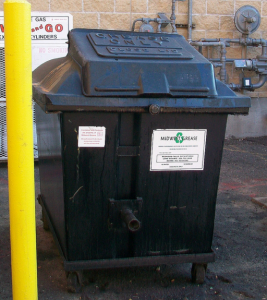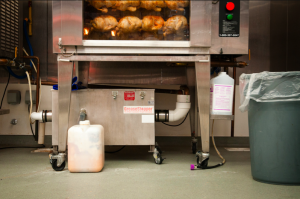
Restaurants can store their used cooking grease in tanks before recycling or selling it. Photo: Ruin Rader (Flickr)
It’s a crime in Great Lakes states to dump cooking grease. It’s also foolish considering the value of leftover fat in the biofuels business.
But that didn’t stop someone in Wisconsin from recently dumping what appeared to be used cooking grease into waterways near Green Bay.
Several state environmental agencies discovered the grease-like substance in two different tributaries late Friday, June 17. One of the spills was fresh; the other had a thicker consistency and a local farmer told officials it was at least a year old.
“We believe that anyone can have an accident, but to find [spills at] two locations – one real fresh and one old – it makes us want to investigate,” said Roxanne Chronert, spills coordinator for the Wisconsin Department of Natural Resources.
Officials collected water samples and will investigate the spill as an intentional dumping. The 50 to 100 gallons were released with enough force to cut gullies into the grass leading from the road to the tributary, Chronert said.
Cooking grease depletes oxygen in water and can harm fish and waterfowl. The fresh spill didn’t kill any fish.
“Usually the invertebrates are the first thing impacted by the lack of oxygen,” Chronert said.
Wisconsin bars the dumping of pollutants such as cooking grease in waterways and requires residents to report hazardous materials spills. It’s like that in Minnesota too.
Wisconsin emergency management typically responds to accidental spills of cooking grease – like when the substance leaks from a truck, Chronert said.
That’s what happened during a 2006 traffic accident involving a grease collection truck in Minnesota. After the truck collided with several cars and a building, some of its load spilled into the sewer system and eventually Duluth Harbor along the Lake Superior coastline, said Sam Brungardt, Minnesota Pollution Control Agency information officer.

Used cooking grease like from the chickens above can be converted into biofuels and animal feed. Photo: Wal-Mart Stores
Careless handling is the cause of most cooking grease spills, Brungardt said. The Minnesota Pollution Control Agency has responded to fewer accidental grease spills after working with restaurants on how to properly handle the substance.
Intentional spills are not common in Minnesota, he said.
There have never been any reports of deliberate cooking grease spills in Indiana, according to the state department of environmental management.
In Ohio, businesses must apply for a state permit to discharge pollutants such as grease into lakes, rivers, streams and even storm drains.
Last summer, Ohio firefighters violated state water quality laws while cleaning up an intentional grease spill by a food vending truck. The firefighters washed the grease down into the sewer system without a proper storm water discharge permit from the city, according The Morning Journal.
Still, it’s not clear why someone would want to intentionally dump cooking grease when there’s a market for it, Chronert said.
A variety of companies collect and recycle cooking grease for bio-diesel fuels and animal feed supplements.
Someone in Pennsylvania apparently found the stuff worthy enough to steal.
An Allentown, Pa. bar and grill in 2009 reported the theft of 300 gallons of cooking grease valued at $500 in potential diesel fuel, according to The Patriot-News.
“That’s probably a big reason why the dumping of cooking grease is relatively rare,” Brungardt said.